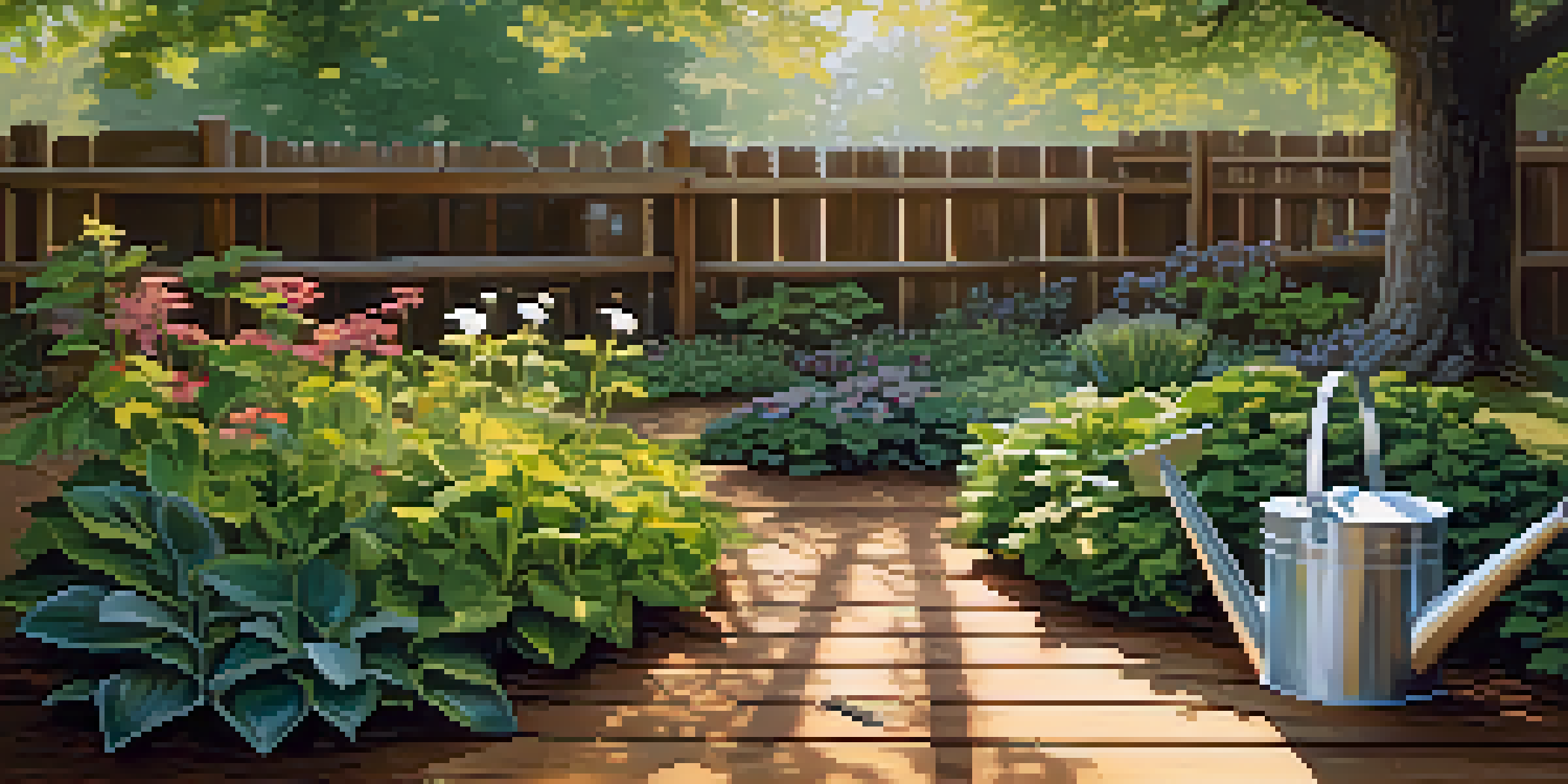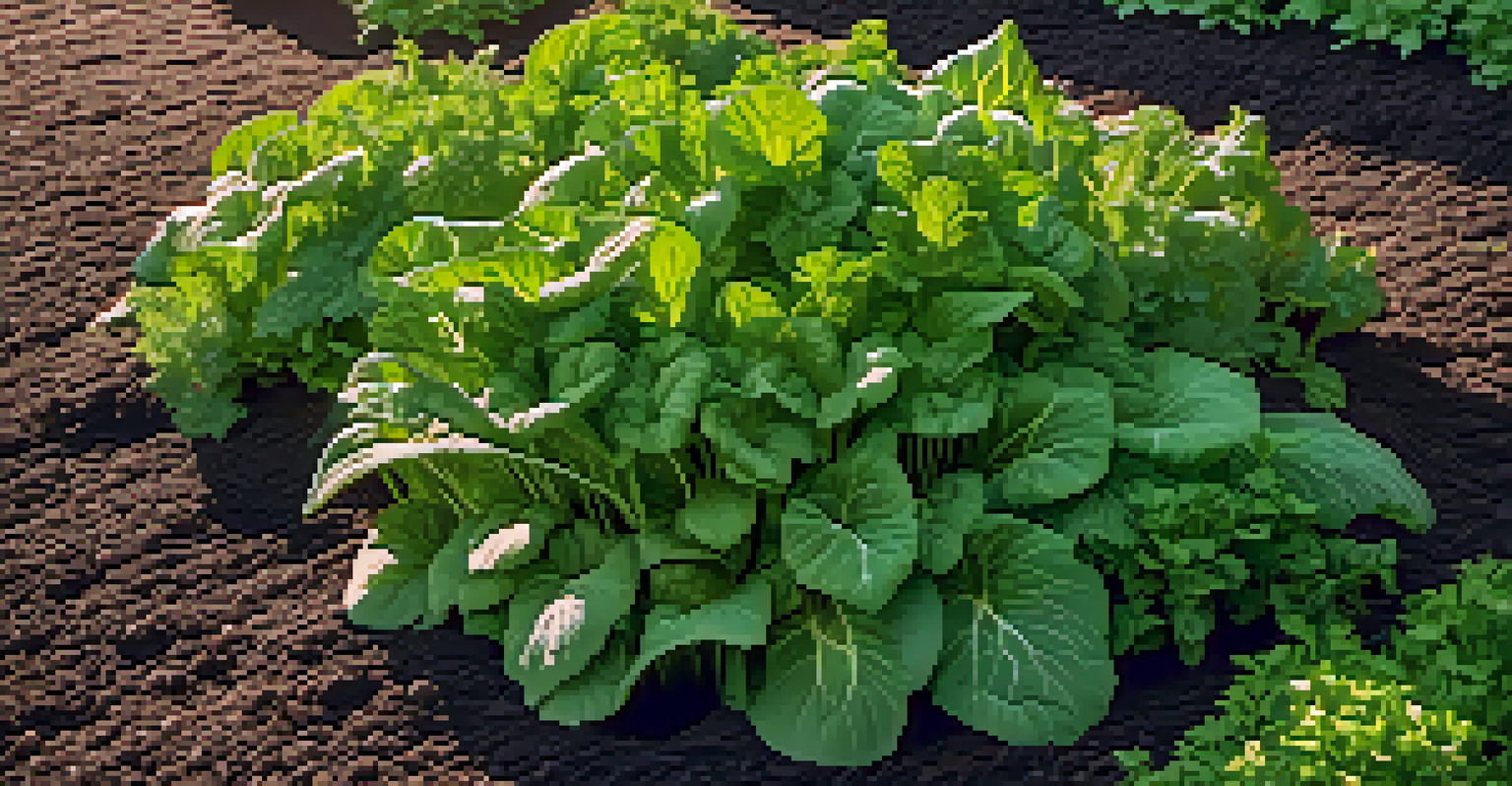Mulching Techniques to Enhance Plant Water Retention

Understanding the Importance of Mulching for Plants
Mulching is more than just a gardening trend; it’s a vital practice that benefits plants significantly. By covering the soil with organic or inorganic materials, mulching helps retain moisture, which is crucial for plant health. This technique not only reduces the need for frequent watering but also protects plants from extreme temperatures, whether it’s scorching heat or frosty conditions.
Mulching is the gardener's best friend, providing both beauty and benefits to your plants.
When you think about it, mulch acts like a cozy blanket for your plants, keeping the soil temperature consistent and preventing evaporation. This is especially important during dry spells when plants are at risk of stress. Additionally, mulch can suppress weeds that compete for water and nutrients, allowing your plants to thrive without competition.
Ultimately, understanding the importance of mulching can change the way you approach gardening. By implementing effective mulching techniques, you can create a healthier environment for your plants, leading to a flourishing garden that's both beautiful and sustainable.
Choosing the Right Mulch Materials for Your Garden
The first step in effective mulching is selecting the right materials. Organic mulches, such as wood chips, straw, and grass clippings, break down over time, enriching the soil as they decompose. In contrast, inorganic options like gravel or landscape fabric provide long-lasting coverage but don’t improve soil health directly.

When choosing mulch, consider your garden type and aesthetic. For instance, if you're growing vegetables, organic mulches are ideal because they enhance soil fertility. However, for ornamental gardens, decorative stones can add a touch of elegance while still performing the essential role of moisture retention.
Mulching Retains Soil Moisture
Mulching effectively retains moisture in the soil, reducing the need for frequent watering and protecting plants from extreme temperatures.
Ultimately, your choice of mulch material can influence not only water retention but also the overall health of your plants. By understanding the benefits and drawbacks of each type, you can make an informed decision that aligns with your gardening goals.
How to Apply Mulch for Maximum Water Retention
Applying mulch correctly is just as important as choosing the right material. Start by ensuring your soil is moist before adding mulch; this helps to lock in moisture beneath the surface. Aim for a thickness of 2 to 4 inches, which is typically sufficient to retain soil moisture while still allowing air and water to penetrate.
A garden is a friend you can visit any time.
When spreading mulch, keep it a few inches away from plant stems and trunks to prevent rot and pest issues. This space allows for proper airflow and reduces the risk of fungal infections. Additionally, be mindful of the type of mulch you’re using; while some materials break down quickly, others may take longer, affecting how often you need to refresh your mulch layer.
By following these application tips, you can maximize the water retention benefits of your mulch. Properly applied mulch not only keeps your plants hydrated but also fosters a healthier garden ecosystem.
Seasonal Mulching: Timing for Optimal Results
Timing your mulching efforts can significantly impact their effectiveness. Applying mulch in the spring helps to retain moisture during the hot summer months ahead. It also suppresses weeds early in the growing season, giving your plants a competitive edge right from the start.
Fall mulching is equally important, especially in colder climates. A layer of mulch can protect plant roots from freezing temperatures while maintaining soil warmth. This seasonal approach ensures that your plants are shielded from extreme weather conditions year-round.
Choose the Right Mulch Material
Selecting the appropriate mulch material, whether organic or inorganic, can enhance plant health and align with your gardening goals.
Understanding the seasonal needs of your garden allows you to implement a strategic mulching schedule. By aligning your mulching practices with the changing seasons, you can enhance plant water retention and overall health.
Benefits of Organic vs. Inorganic Mulch
When it comes to mulch, organic and inorganic options each have their unique benefits. Organic mulch, such as shredded leaves or bark, not only retains moisture but also enriches the soil as it decomposes. This ongoing nutrient supply can be a game-changer for your plants, enhancing their growth and resilience.
On the flip side, inorganic mulch like stones or plastic sheeting provides excellent moisture retention without breaking down. This means less maintenance, as you won’t need to replace it as frequently. However, it lacks the soil-enriching properties that organic options provide.
Ultimately, the choice between organic and inorganic mulch depends on your garden's specific needs. By weighing the advantages of each type, you can select the best mulch to support your plants' water retention and overall health.
Mulching Techniques for Different Plant Types
Different plants have varying needs when it comes to mulching, so tailoring your approach is essential. For instance, vegetable gardens thrive with organic mulch, which not only conserves moisture but also adds nutrients as it decomposes. This can lead to healthier vegetables and a more bountiful harvest.
On the other hand, ornamental plants may benefit from a decorative mulch that complements your landscape design. Using larger stones or colored mulch can enhance the visual appeal while still providing moisture retention. However, make sure it doesn’t impede water infiltration.
Regular Maintenance is Crucial
Consistent maintenance of your mulch layer is essential for long-term water retention and overall garden health.
Understanding the specific requirements of your plants allows you to choose the most effective mulching technique. By matching your mulch to the needs of different plant types, you can create a thriving garden ecosystem.
Maintaining Mulch for Long-Term Water Retention
To reap the long-term benefits of mulching, regular maintenance is key. Over time, organic materials will decompose, requiring you to refresh the mulch layer to maintain its effectiveness. This not only ensures continued moisture retention but also enriches the soil with nutrients.
Additionally, keep an eye out for weeds that may infiltrate your mulch layer. Regularly removing these invaders will help your plants access the water and nutrients they need without competition. A quick check every few weeks can save you time and effort in the long run.

By committing to maintain your mulch, you can ensure that your plants continue to thrive. A little attention goes a long way in supporting water retention and overall garden health.